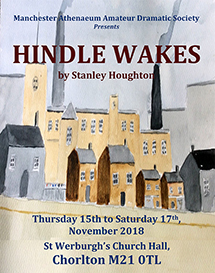Association of Community Theatre

HINDLE WAKES
by Stanley Houghton
Manchester Athenæum D.S.
 I approached St Werburgh's tonight with mixed feelings – pleasurable anticipation because I was on my way to see this well-known old play, one which I had never seen before, and a heavy heart, because a dear friend, David Garner, who should have played Nathaniel Jeffcote, in this production, had suddenly collapsed and died, virtually almost on stage, whilst taking part on the opening night of a production at Altrincham Little Theatre. The play was called “Fondly Remembered” – and he will be by so many. How can one explain such an apt title and the coincidence of it all?
I approached St Werburgh's tonight with mixed feelings – pleasurable anticipation because I was on my way to see this well-known old play, one which I had never seen before, and a heavy heart, because a dear friend, David Garner, who should have played Nathaniel Jeffcote, in this production, had suddenly collapsed and died, virtually almost on stage, whilst taking part on the opening night of a production at Altrincham Little Theatre. The play was called “Fondly Remembered” – and he will be by so many. How can one explain such an apt title and the coincidence of it all?
Your play is set in a fictional town called Hindle in Lancashire, the North of England, and is about two young people, Fanny Hawthorn and Alan Jeffcote. Her parents are at a loss as regarding her actual whereabouts over this particular Wakes week-end when, of course, all businesses including the mill where she works, are closed. They seem to favour that she is with her friend, Mary, at least her father does, but mother is doubtful, having heard that Mary has been seen elsewhere over the week-end. A postcard has been received from Blackpool. When Fanny returns home, and asked to explain her whereaboys, her explanations are not believed. Mr Hawthorn decides he must go to see Nathaniel Jeffcote, who owns the mill. where he and his daughter work. Nat, as well as being his employer. is his friend and for whom he has worked for many years and, of course, is Alan’s father.
Class is an important feature of the story. Fanny is a mill hand and Alan’s father is the boss. His mother is in direct opposition to any togetherness. Obviously something has to be done and the families have to consult and talk it all over.
Interestingly, the play was first performed in 1912 by Annie Horniman’s Company at the Gaiety Theatre in Manchester. It was very controversial at the time because of its treatment of extra-marital sex which would set a bad example it was thought. The Vice Chancellor of Oxford University placed all theatres producing it out of bounds to all students.
Most of the play takes place in the living-room of the Jeffcote house . The difference in class status of the two families is instantly and superbly shown immediately Act One ends. The Hawthorn residence is played downstage with black drapes forming the back wall of the kitchen, and the only furniture is a wooden table and chairs at which, presumably Mr. and Mrs. Hawthorn have just finished their meal. The scene ends, the curtains go and we are left with the Victorian splendour of the Jeffcote’s living room, which now is full stage. It is well furnished exactly in the right time period. with double-doors US and elaborate fireplace SL. Substantial table CS at which Mrs Jeffcote is sitting embroidering, necessary tables, etc., in evidence, seating, and floral decoration SL. Mr Jeffcote is also there, presumably after a meal. when Ada, the maid, announces Mr and Mrs Hawthorn.
I have already mentioned the theme of the play and its relationships to social status when it affects particularly the feelings and activities of young people, and, of course, the reactions of mature relations in their families once they become involved. I genuinely feel that every character on the stage, supported, enhanced, and strengthened their positions within the theme at that particular time in history. Their views, feelings and points of view were expressed with belief, sincerity and easily understood dignity, which interested and enhanced the story for the audience. The eventual reasoning out and decisive decisions made by Fanny and Alan were memorably displayed, as well as a depiction of inner feelings rather than learnt lines. Well played by all involved. I could well believe we, as an audience, were involved in a real life situation and not actually watching a play in a theatre. Your actors believed in everything they said and did, and therefore, so did we. There was quality and reality throughout and rapt attention from your audience, Well done indeed.
Nat Jeffcote was played at extremely short notice by Roger Browne, standing in for David Garner, somewhat less than three weeks I believe. It is a leading role with a great deal of dialogue but it wasn’t just that Roger had become word perfect, he had become Alan’s father and the boss, and all that that called for, and somehow had gone beyond acting. The cast too, seemed to emphasize the reality of the situation they were in, and turned a story into a real life situation. Belief flooded your stage tonight and we saw a cast playing as a team, supporting and reinforcing each other, and that is the memory that will predominate whenever I think of your “”Hindle Wakes”.
Ian Darke and Jane Parker were Fanny Hawthorn’s parents, and Fanny was played by Liz Hudson. Alan Jeffcote was Sam Jones, and Beatrice Farrar was played by Aimee Chas. Roger Browne was Nat Jeffcote, and his wife, Alan’s mother, was played by Rosemary Mark. Sir Timothy Farrar, Beatrice’s father, was John Jones and Ada, the maid, was Amelia King, The scene between Sam and Aimee when confessions were made, and their future together was sensitively decided, was the true meaning behind the story line.
I have treated this review somewhat differently from usual, because I believe every member of your cast played out the story as if it were a real life situation in which they were directly involved, either as an individual, or a parent, or a friend and were challenged to react to a social situation that was beginning to affect young people particularly. They all showed sensitivity, emotion, feelings, consideration, love and understanding together. Your director, Bea Turner, is to be congratulated for an intense and heartfelt production in which she drew from each member of the cast quite memorable performances.
Well done, all of you. Happy playmaking. Many thanks for your welcome and hospitality.